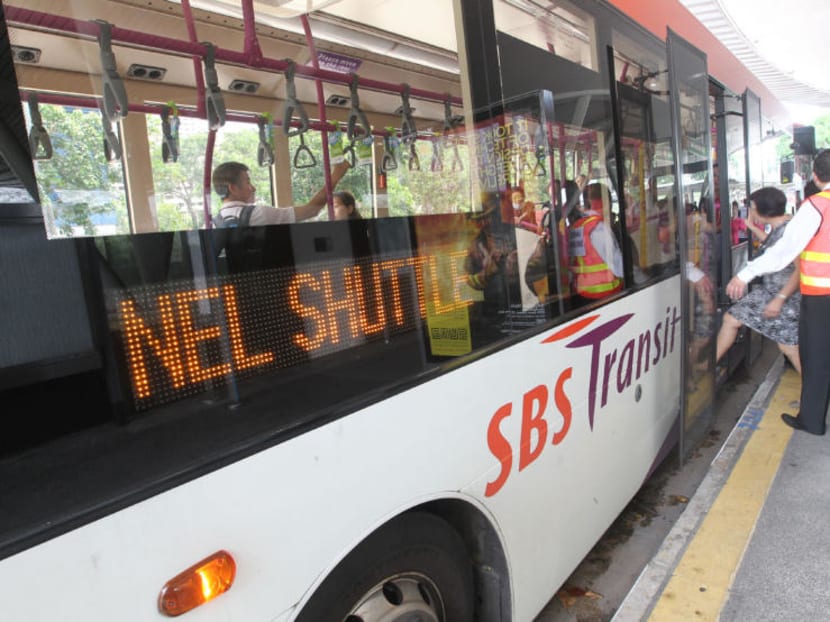Issues raised by lawsuit claims affect 6,000 bus drivers, SBS Transit takes case to Industrial Arbitration Court
SINGAPORE — Saying that the wage dispute claims filed by five of its bus drivers raised some “issues”, SBS Transit (SBST) is taking the matter to the Industrial Arbitration Court (IAC), which arbitrates industrial disputes and certifies collective agreements between unions and employers.

Five bus drivers have filed lawsuits against their employer SBS Transit, alleging that since they began working for the company, they have not been paid for overtime hours.
SINGAPORE — Saying that the wage dispute claims filed by five of its bus drivers raised some “issues”, SBS Transit (SBST) is taking the matter to the Industrial Arbitration Court (IAC), which arbitrates industrial disputes and certifies collective agreements between unions and employers.
This has to do with the collective agreement that SBST made with the National Transport Workers’ Union (NTWU), and the Ministry of Manpower (MOM) said that the agreement’s terms “affect not just the five individual bus captains, but also affect approximately 6,000 other SBST bus captains as well”.
A collective agreement is a contract negotiated by a trade union with the management of a company that regulates the terms and conditions of employees.
The announcement on Friday (Oct 18) by SBST has “surprised” the five drivers who filed lawsuits against the public transport operator last month, their lawyer said. They had gone to the Magistrates' Court when they could not seek redress with SBST and NTWU, but SBST emphasised that this development “has nothing to do with mediation”.
Separately, the drivers’ claims will still be heard at the Magistrates’ Court.
SBST said that it is referring the case to IAC because the claims made by the drivers “raise issues that arise from and affect collective agreements that SBST has entered into with NTWU”.
Ms Tammy Tan, its senior vice-president of corporate communications, said: “It is to interpret collective agreements which have been called into question.
“In doing so, SBST is acting in accordance with the law, in the interests of all of SBST bus captains and in keeping with the letter and spirit of our excellent relationship with the NTWU.”
In September, the five drivers sued SBST, a member of ComfortDelGro, alleging that since they began working for the company, they have not been paid for overtime hours — which is against MOM’s regulations.
Before filing the lawsuits, one of the drivers was said to have met NTWU in July and with various parties from SBST and ComfortDelGro in August but did not receive “conclusive answers”.
On Friday, the drivers’ lawyer, Mr M Ravi from Carson Law Chambers, said: “Having lost their confidence in the NTWU in the first place, our clients withdrew from the NTWU and rightfully sought redress from the court as a means to seek justice.”
The drivers were “therefore surprised” by SBST’s latest move, Mr Ravi said, since they had “filed their claims in the Magistrates’ Court after all discussion and internal processes with the employer and the union had exhausted”.
“To respect the rule of law and the jurisdiction of the court, the redress ought to continue in the courts and can be resolved amicably (if so desired) by utilising the mediation stage of the court process,” he added.
Asked to respond to Mr Ravi’s comments, Ms Tan of SBST told TODAY that “the reference to IAC has nothing to do with mediation”.
She said: “SBST fully respects the jurisdiction of the court, which is why we will continue to vigorously contest the bus captains’ claims in court.”
In a statement, the Singapore National Employers Federation (SNEF) said that applying to the IAC to interpret certain provisions in the collective agreement is a "responsible and appropriate" step for SBST to take.
This is because SBST's collective agreement with NTWU is certified by the IAC.
Mr Kandhavel Periyasamy, director of industrial relations with the labour relations and workplaces division of MOM, said that the collective agreement affects about 6,000 other SBST bus drivers. The IAC is thus a “more appropriate forum to deal with this matter as it is a specialised court to arbitrate on industrial disagreements and it serves to maintain industrial peace”, he added.
When asked to comment, NTWU said it agreed that IAC will serve as an appropriate platform for disputes relating to employment matters.
ABOUT THE CASE
The drivers — comprising three Singaporeans and two Malaysians — had alleged that their employer SBST breached contract terms on several fronts which include:
Expecting them to drive for seven consecutive days before getting a day off, which was purportedly not what they agreed on with SBST based on their letter of appointment. The Employment Act stipulates that shift employees should be given a rest day in each week, if they worked continuously for 30 hours.
Getting them to work more than 44 hours a week, which similarly goes against the Employment Act.
Underpaying them for overtime work done on their rest days. Workmen are entitled to claim overtime pay if their basic salaries do not exceed S$4,500, and their employers are expected to pay them a minimum of 1.5 times their hourly basic pay.
The five of them are seeking damages to be assessed for wages, statutory interest of 5.33 per cent every year, and costs.











